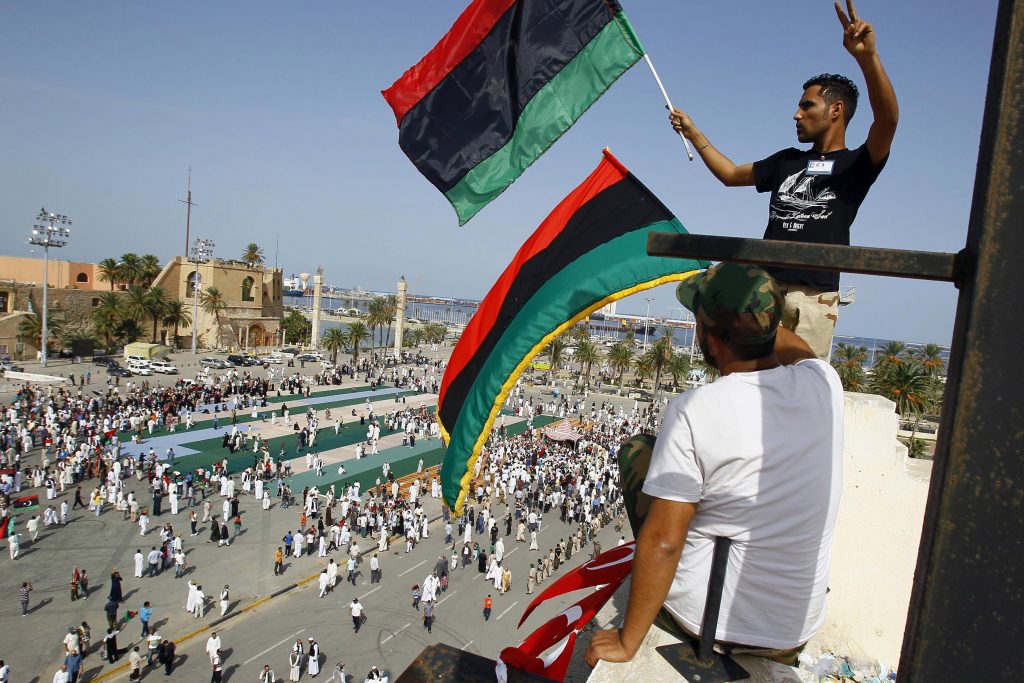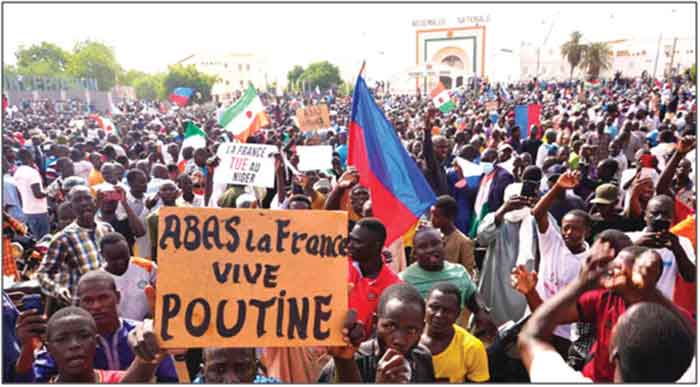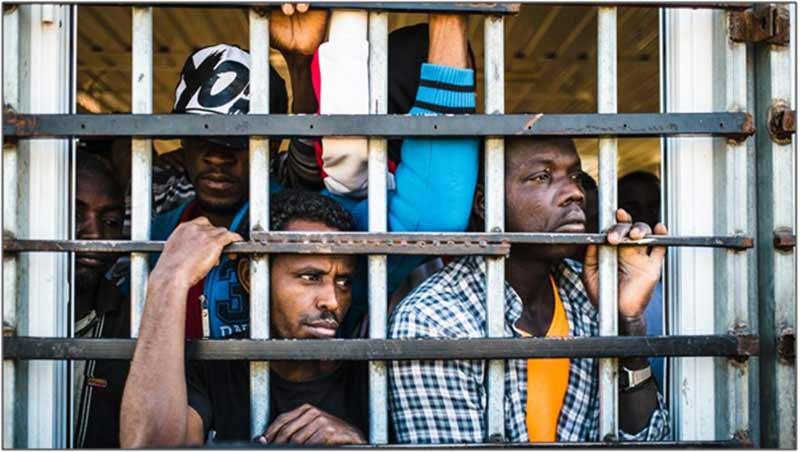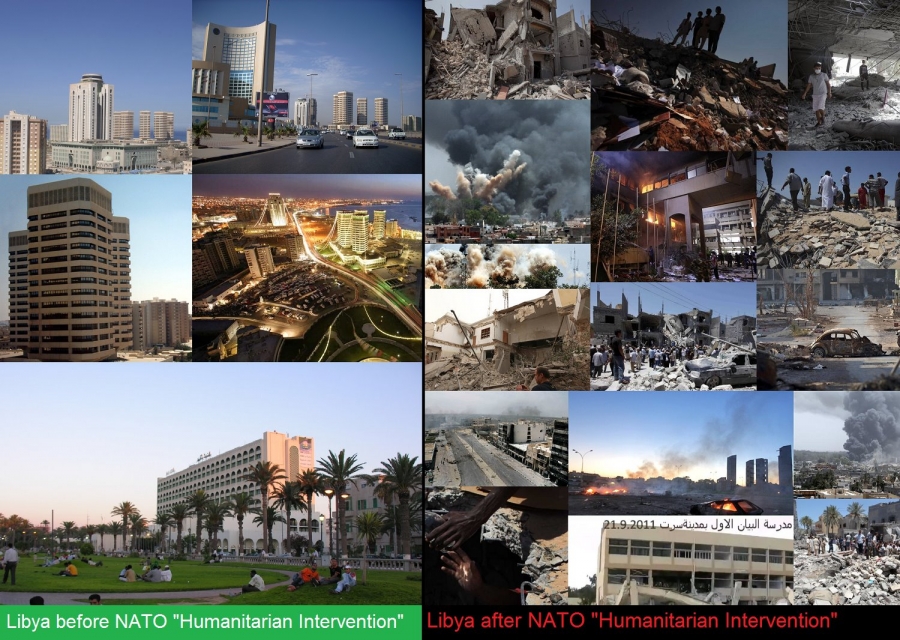
Libya is becoming a crucible for would-be regional powers. The intractable civil war that has carved apart the oil-rich North African country is in reality a multisided chess match between a variety of outside actors, from Turkey to the United Arab Emirates, France and Egypt.
The battle involves thousands of Syrian militiamen and Sudanese mercenaries. Countries are deploying drones, fighter jets and missiles.
The Turkish-backed group in Tripoli is in command of Libya’s west and may hope to wrest control of the country’s strategic “oil crescent,” an arc of coastal towns and oil facilities in the interior in between Tripoli, the capital, and the eastern city of Benghazi.
“Erdogan and some of his allies believe that Turkey is restoring its importance in the eyes of its western allies,” Ozlem Kaygusuz, an associate professor of international relations at Ankara University, told the Financial Times. “They believe that the more Turkey plays an assertive role, the more it will become valuable and impossible to ignore for western interests in the region.”
Erdogan has railed against Sissi ever since the latter came to power in a 2013 coup that brought down Egypt’s short-lived Islamist government.
“They are each other’s nemeses,” Soner Cagaptay, a Turkey scholar at the Washington Institute for Near East Policy, told Today’s WorldView. “A secularist general who locked up political Islamists, and a political Islamist who locked up secularist generals.”
As part of its intervention, the Turkish government secured a major agreement with Tripoli over maritime rights and access to drill off Libya’s coast. The deal has provoked Brussels, with EU officials seeking to preserve the interests of Greece and Cyprus in the eastern Mediterranean. Turkish strategists see an alarming axis of rivals, from old adversary Greece to Egypt and Israel, working in concert against their concerns in the region.
“There’s not a single policymaker in Ankara, including those who hate Erdogan, who is not worried about this idea of being encircled in the eastern Mediterranean,” said Cagaptay.
Moscow had a historic relationship with Libya during the Cold War.
“Proxy forces … have previously had a seat at the negotiating table and have had undue influence on the outcome, but now have almost become the principal interlocutors,” Rear Adm. Heidi Berg, the top intelligence officer at U.S. Africa Command, said in an interview.
Over the weekend, in a joint statement, German Chancellor Angela Merkel, French President Emmanuel Macron and Italian Prime Minister Giuseppe Conte urged “all foreign actors to cease their interference and respect the arms embargo established by the UN Security Council.” But such calls ring hollow when set against France’s own engagement in the conflict, which sees it butting heads with a fellow NATO member state.
Libya conflict: Risk of Turkey-Egypt clash increases
Risk of Turkey-Egypt clash in Libya increases as following Turkey’s military interference in Libya Egypt’s parliament on Monday authorized the deployment of troops outside the country. The size and nature of the Egyptian military deployment was unclear.
The Egyptian move could escalate the spiraling war in Libya after Egypt’s president Abdel-Fattah el-Sissi threatened military action against Turkish-backed forces in the oil-rich country.
A troop deployment in Libya could bring Egypt and Turkey, close U.S. allies that support rival sides in the conflict, into direct confrontation.
Abdel-Fattah el-Sissi has called the strategic coastal city of Sirte a “red line” and warned that any attack on the city, which sits near Libya’s main oil-export terminals and fields, would prompt Egypt to intervene to protect its western border.
“Egypt will spare no efforts to support the sister Libya … to overcome the current critical crisis,” the Egyptian presidency said in a statement after a meeting of the National Defense Council on Sunday that was chaired by el-Sissi.
Libya’s east-based parliament, the sole elected body in the country, urged Egypt to send troops.
Last week, el-Sissi hosted dozens of tribal leaders loyal to Marshal Khalifa Hifter in Cairo, where he repeated that Egypt will “not stand idle in the face of moves that pose a direct threat to security.”
Turkish-backed Islamist forces allied with the government in Tripoli are mobilizing on the edges of Sirte and have vowed to retake the Mediterranean city, along with the inland Jufra airbase, from rival forces commanded by Hifter and based in the east.
After a closed-door session in Cairo, Egypt’s House of Representatives approved plans to send troops to “defend Egyptian national security in the strategic western direction against the actions of armed criminal militias and foreign terrorists.”
Libya was plunged into chaos when a NATO-backed uprising in 2011 toppled Moammar Gadhafi, who was later murdered by NATO-backed armed groups.
Drawn by Hifter’s anti-Islamist stance, Egypt, the United Arab Emirates and other foreign powers have provided his forces with critical military assistance against western militias. Russia has also emerged as a key supporter of Hifter.
Turkey, a bitter rival of Egypt in a broader regional struggle over political Islam, is the main patron of the Tripoli forces, which are also backed by the wealthy Gulf state Qatar.
Relations between Egypt and Turkey have steadily deteriorated since 2013, when el-Sissi led the military overthrow of Mohamed Morsi, an Islamist who enjoyed Turkey’s support.
Egypt’s state-run Al-Ahram daily reported on Sunday that the vote in parliament was intended to mandate el-Sissi to “intervene militarily in Libya to help defend the western neighbor against Turkish aggression.”
El-Sissi has pushed hard in recent weeks for a cease-fire and political settlement. The Egyptian military, which has for years steered clear of overseas adventures and focused on fighting Islamic militants in the Sinai Peninsula, may be wary of deep involvement in Libya’s chaotic conflict.
New headache for Washington
The “distinct possibility” of direct conflict between Egypt and Turkey, a NATO member, presents a “brand new headache for Washington,” said Jalel Harchaoui, a research fellow specializing in Libyan affairs at the Clingendael Institute, an independent think tank in the Netherlands.
The U.S. has sent mixed signals to the rival sides over the course of the war. Although increasingly concerned about Moscow’s growing influence in Libya, Washington “doesn’t want to articulate a real, coherent Libya policy,” Harchaoui said, leaving a void that has allowed Russia and Turkey to become major players.
In a call on Monday with U.S. President Donald Trump ahead of the Egyptian parliament vote, el-Sissi said Egypt’s aim is to “prevent further deterioration of security in Libya,” according to a statement from the Egyptian presidential spokesman. It said the two leaders agreed on maintaining a cease-fire and avoiding a military escalation in Libya.
Turkey sends Tunisian Daesh to Libya
Turkey is continuing its belligerent campaign in Libya in favor of the Tripoli-based government of Fayez Sarraj, which is facing the Libyan National Army (LNA) of Marshal Hifter.
Reports said Turkish president Recep Tayyip Erdogan has sent 2,500 members of the Daesh branch in Tunisia to Libya in recent months.
By order of the Government, Turkish intelligence has transferred jihadist groups and Daesh members of different foreign nationalities from Syria to Libya in recent months.
The Ottoman intelligence assigned 2,500 members of the Tunisian Daesh group to Libya, out of the thousands of other Tunisians from the jihadist group operating in Syria, in which another civil war is taking place, involving Turkey, which is reported to be cooperating with paid terrorist elements on their behalf.
The number of troops who arrived in Libya increased to 16,100 Syrian mercenaries, including 340 children under-18, of whom 5,600 returned to Syria after completing their contracts and obtaining their salaries.
Turkey continues to recruit more mercenaries who are brought to Turkish soil for military training.
Commanders of Turkish-backed factions embezzle the emoluments assigned to combatants, which has led to great unrest among the ranks of mercenaries and some defections. In this regard, the monthly salaries assigned to paid soldiers are higher than what they eventually receive.
Meanwhile, the number of Syrian mercenaries backed by Turkey who were killed in military operations in Libya has increased to almost 470, including 33 under-18 years of age, as well as some commanders of the detachment.
Turkey actively participates in the wars in Libya and Syria with the clear objective of obtaining a better geostrategic position and to achieve greater financial resources linked to the exploitation of oil and gas resources in the Mediterranean arc. This intervention makes use of the mercenaries in the pay of various nationalities coming from Syrian territory, some of them linked to former groups linked to jihadist organizations such as Daesh and Al-Qaeda.
Recently, there has also been speculation that Turkey might also send officials from Somalia to Libya to support the Tripoli-based government.
In November 2019 Erdogan and Sarraj signed an agreement guaranteeing Turkish military support to the Tripoli-based government, opposite the LNA led by Hifter, linked to the other eastern executive in Tobruk; a pact by which the distribution of exclusive economic zones in the Mediterranean also took place, which provoked the protest of countries like Greece and Cyprus when they considered that their maritime borders were being violated.
This Sunday’s visit by the Turkish Defense Minister, Hulusi Akar, to Qatar to meet with Emir Tamim bin Hamad al-Thani probably dealt with this issue of the intervention in Libya. Here may lie the key to the possible dispatch of Somali officers to the North African country, since Doha is a base for the military training of Somali commanders and a starting point for the transfer of fighters to conflict zones in the Middle East.
Libya Review has referred to a report that several Somali intelligence officers were receiving training in the Qatari capital with the aim of expanding the influence of the Gulf monarchy on the African continent.
According to this media, Turkey seriously values the sending of officers from Somalia to support the Tripoli group in a war like the Libyan one, which has become an international game board with the participation of foreign powers in favor of the confronted factions to try to make profits from the situation.
The Tripoli group is supported by Turkey, Qatar and Italy; while, the LNA is supported by Saudi Arabia, Egypt, the Emirates, Russia and France.
This latest information comes just as the Pentagon has recently confirmed that Turkey stationed between 3,500 and 3,800 Syrian mercenaries in Libya in the first three months of the year.
Egypt’s strong military message to Turkey, Tunisia
Last month, Abdel Fattah el-Sissi warned of the readiness of his country’s army to intervene both within and outside its borders, in a clear reference to the conflict in neighboring Libya.
El-Sissi wanted to send strong messages to all: The Egyptian forces are ready to enter any confrontation, and with any party, in order to protect Egypt’s national security.
“Any direct intervention in Libya will be aimed at securing the border,” the Egyptian president said, adding that “any direct intervention by Egypt now has international legitimacy,” and that “some think they can trespass on the Sirte or Al-Jufra front lines. This, for us, is a red line. As long as the neighboring countries are stable, Egypt is stable. This is what the distant and near history has taught us, and so did the Egyptian military doctrine, which only intervenes if asked. This happened in the 1948 war in Palestine against Zionist gangs and in the 1991 war for the liberation of Kuwait.”
The Egyptian military’s strength is ranked ninth in the world according to the Global Firepower Index.
The image of the Egyptian government, people and army standing united sends a very important message of deterrence to anyone who believes that confrontation with Egypt is easy or who wants to exploit a fictitious division of opinions on the nature of the tasks and priorities of the Egyptian state.
SIGN UP FOR COUNTERCURRENTS DAILY NEWSLETTER















































